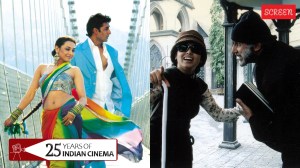Kerala anganwadis will now have egg biryani, and credit goes to a 3-year-old boy
In February, Shanku’s mother shared his request on Instagram. It caught Kerala minister Veena George’s attention.
 State Health, Women and Child Welfare Minister Veena George had also shared the video and said the government would consider Shanku’s suggestions and revise the food menu at anganwadis. (Express photo)
State Health, Women and Child Welfare Minister Veena George had also shared the video and said the government would consider Shanku’s suggestions and revise the food menu at anganwadis. (Express photo)Months after a video of a three-year-old boy asking for biryani and chicken fry instead of upma at his anganwadi went viral, the Kerala government on Tuesday revised the food menu at childcare institutions in the state.
The video showed the boy, Trijal S Sundhar, telling his mother, “I want biryani and chicken fry at the anganwadi instead of upma.” His mother recorded the video when Shanku, as Trijal is fondly known, made the request while she was feeding him biryani at home on January 26. The mother then posted the video on Instagram, after which it was widely shared in the coming weeks.
State Health, Women and Child Welfare Minister Veena George had also shared the video and said the government would consider Shanku’s suggestions and revise the food menu at anganwadis.
On Tuesday, while inaugurating the new academic year for anganwadis in Pathanamthitta district, minister George kept her promise, unveiling the revised menu.
“This is the first time that a unified menu is being implemented in anganwadis. The menu was renewed after discussions at various levels. It includes egg biryani and pulao. The food menu has been revised to ensure the health of children by reducing the intake of sugar and salt. Supplementary nutrition, such as breakfast, lunch and general feeding for anganwadi children, has been revised. Milk and eggs, which were provided every two days, will now be provided three days a week,” she said.
Kerala has around 33,000 anganwadis, and in 2022, the state government introduced a scheme to provide milk and eggs to children through these institutions. Recently, the state government began the process of converting all anganwadis in the state into “smart anganwadis”, with study rooms, rest rooms, kitchen, store room, dining room, hall, garden, and indoor and outdoor play areas. The state also revised the wages of anganwadi teachers, 95% of whom are women.







